German actress Käthe Dorsch (1890-1957) was a famous stage actress in Vienna and Berlin. She also made several silent and sound films and was married to Harry Liedtke. During the war, she played a heroic role by saving colleagues in trouble.

German postcard by NPG (Neue Photographische Gesellschaft), no. 972. Photo: Käthe Hirschfeld, Berlin.

German postcard by Ross Verlag, no. 467/1, 1919-1924. Photo: Riess.
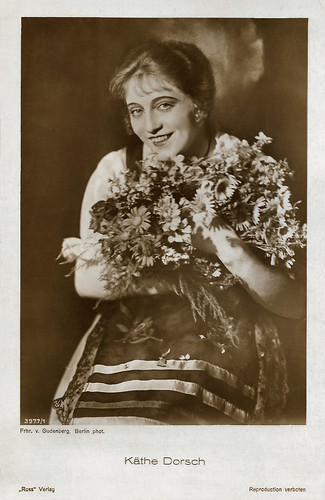
German postcard by Ross Verlag, no. 3977/1, 1928-1929. Photo: Frhr. v. Gudenberg, Berlin.

German postcard by Ross Verlag, no. 5561/1, 1930-1931. Photo: Elli Marcus, Berlin.
Katharina Dorsch was born in Neumarkt in der Oberpfalz, Germany in 1890. She was the daughter of a gingerbread baker from Nürnberg (Nuremberg). After commercial school, she followed piano classes, and as a fifteen-year-old, she started singing in a choir in Neurenberg, and subsequently in operettas in Hanau and Mannheim.
Her career really started in 1908 as an operetta soubrette with a performance in 'Wiener Blut'(Vienna Blood) in Mainz, and in 1911 she moved to Berlin for an engagement at the Neue Operettentheater. More Berlin engagements followed in theatres like the Lessingtheater and the Deutschen Theater.
As early as 1913, Käthe Dorsch, had her first film role in the short, silent comedy Wenn die Taxe springt/When the Rates Jump (Danny Kaden, 1913). In 1920 she married colleague film star Harry Liedtke, with whom she had appeared in the fairy tale Dornröschen/Sleeping Beauty (Paul Leni, 1917). They were a couple for eight years.
She played in several films, including Der Blusenkönig/The King of Blouses (Ernst Lubitsch, 1917), Erborgtes Glück/Hided Happiness (Arthur Wellin, 1919) with Alexander Moissi, and the August Strindberg adaptation Fräulein Julie/Miss Julie (Felix Basch, 1921) with Asta Nielsen.
After Muss die Frau Mutter werden?/Paragraph 144 (Georg Jacoby, Hans Otto Löwenstein, 1924) opposite Harry Liedtke, she retired from the film business and devoted herself exclusively to the theatre where she became one of the great actresses of her time. In 1927 she started to work in Vienna and appeared there at the Volkstheater. From 1939 till her death, she was a permanent member of the Burgtheater. From 1951 she also appeared again on the stages of Berlin.

German postcard by Photochemie, Berlin. Photo: Käthe Dorsch, Lotte Reinecken and Emil Sondermann in the stage play 'Egon und seine Frauen' (Egon and his wives) at the Thalia-Theater, Berlin.

German postcard by Photochemie, Berlin. Photo: Käthe Dorsch, Erna Ritter and Elsa Grünberg in the stage play 'Egon und seine Frauen' (Egon and his wives) at the Thalia-Theater, Berlin.
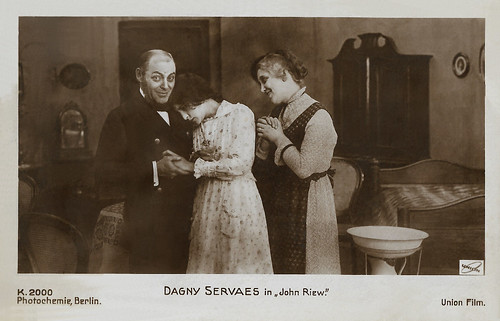
German postcard by Photochemie, no. K. 2000. Photo: Union Film. Dagny Servaes as Anna Seyers in John Riew (Walter Schmidthässler, 1917). The man left of her is Hermann Vallentin, who plays Captain John Riew. The woman on the right is Käthe Dorsch, who plays Anna's mother.

German postcard by Photochemie, Berlin, no. K. 2001. Photo: Union Film. Publicity still for John Riew (Walter Schmidthässler, 1917) with Hermann Valentin, Dagny Servaes and Käthe Dorsch.
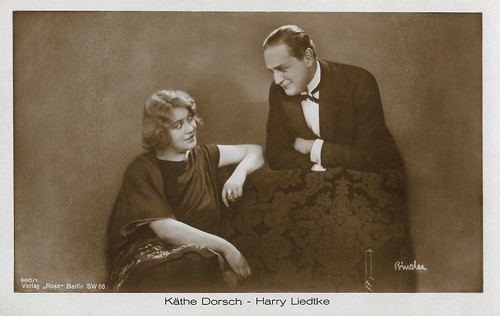
German postcard by Ross Verlag, no. 980/1, 1925-1926. Photo: Alex Binder. Käthe Dorsch and Harry Liedtke in Muß die Frau Mutter werden/Paragraph 144 (Georg Jacoby, Hans Otto, 1924).
The sound film offered Käthe Dorsch more possibilities than the silent cinema to express herself. After a long interval, she appeared again in the film Die Lindenwirtin/The Linden Tree Landlady (Georg Jacoby, 1930) with Hans Heinz Bollmann. She impersonated important women like Maria Theresia in Trenck, der Pandur/Trenck, the Pandur (Herbert Selpin, 1940) and Friederike Caroline Neuber in the melodrama Komödianten/The Comedians (Georg Wilhelm Pabst, 1941).
Other popular films in which she appeared were Drei Tage Liebe/Three Days of Love (Heinz Hilpert, 1931) opposite Hans Albers, the murder mystery Savoy-Hotel 217 (Gustav Ucicky, 1936) again opposite Albers, the Oscar Wilde adaptation Eine Frau ohne Bedeutung/A Woman of No Importance (Hans Steinhoff, 1936), Mutterliebe/Mother Love (Gustav Ucicky, 1939), and Morgen werde ich verhaftet/Tomorrow I Will Be Arrested (Karl-Heinz Stroux, 1939) with Ferdinand Marian.
During the war, she played a heroic role by saving colleagues in trouble. For this, she used her friendship with Hermann Göring, whom she knew from childhood. After the war, she devoted herself to the Burgtheater for which she played major parts in classic plays.
Incidentally, she appeared in films like Singende Engel/Singing Angels (Gustav Ucicky, 1947) with Hans Holt, Fahrt ins Glück/Journey Into Happiness (Erich Engel, 1948) with Rudolf Forster and Hildegard Knef, the melodrama Der Bagnosträfling/The Bagno Convict (1949, Gustav Fröhlich) with Paul Dahlke, Das Kuckucksei/The Cuckoo’s Egg (Walter Firner, 1949) with Curd Jürgens, and Regine (Harald Braun, 1955) with Horst Buchholz.
In 1956 she caused a media scandal when she slapped Vienna theatre critic Hans Weigel in the face in broad daylight. In the following trial, she was condemned to pay 500 Schilling. Käthe Dorsch died in 1957, in Vienna, Austria. She determined her heritage for a foundation to help poor artists. This foundation still exists today. In Vienna, there is now a Käthe-Dorsch-Gasse, and in Berlin, a street is called the Käthe-Dorsch-Ring.

German postcard by Ross Verlag, no. A 2901/1, 1939-1940. Photo: Wien-Film / Ufa.

German postcard by Ross Verlag, no. A 3271/1, 1941-1944. Photo: Quick / Tobis.
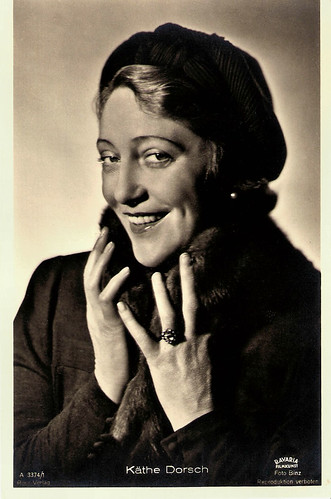
German postcard by Ross Verlag, no. A 3374/1, 1941-1944. Photo: Bavaria Filmkunst / Tita Binz.
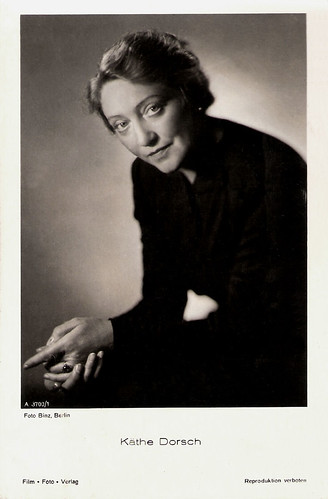
German postcard by Film-Foto-Verlag, no. A 3700/1, 1941-1944. Photo: Binz, Berlin.
Sources: Thomas Staedeli (Cyranos), Steffi-line.de (German), Wikipedia (German), and IMDb.
This post was last updated on 24 January 2024.

German postcard by NPG (Neue Photographische Gesellschaft), no. 972. Photo: Käthe Hirschfeld, Berlin.

German postcard by Ross Verlag, no. 467/1, 1919-1924. Photo: Riess.

German postcard by Ross Verlag, no. 3977/1, 1928-1929. Photo: Frhr. v. Gudenberg, Berlin.

German postcard by Ross Verlag, no. 5561/1, 1930-1931. Photo: Elli Marcus, Berlin.
Operetta soubrette
Katharina Dorsch was born in Neumarkt in der Oberpfalz, Germany in 1890. She was the daughter of a gingerbread baker from Nürnberg (Nuremberg). After commercial school, she followed piano classes, and as a fifteen-year-old, she started singing in a choir in Neurenberg, and subsequently in operettas in Hanau and Mannheim.
Her career really started in 1908 as an operetta soubrette with a performance in 'Wiener Blut'(Vienna Blood) in Mainz, and in 1911 she moved to Berlin for an engagement at the Neue Operettentheater. More Berlin engagements followed in theatres like the Lessingtheater and the Deutschen Theater.
As early as 1913, Käthe Dorsch, had her first film role in the short, silent comedy Wenn die Taxe springt/When the Rates Jump (Danny Kaden, 1913). In 1920 she married colleague film star Harry Liedtke, with whom she had appeared in the fairy tale Dornröschen/Sleeping Beauty (Paul Leni, 1917). They were a couple for eight years.
She played in several films, including Der Blusenkönig/The King of Blouses (Ernst Lubitsch, 1917), Erborgtes Glück/Hided Happiness (Arthur Wellin, 1919) with Alexander Moissi, and the August Strindberg adaptation Fräulein Julie/Miss Julie (Felix Basch, 1921) with Asta Nielsen.
After Muss die Frau Mutter werden?/Paragraph 144 (Georg Jacoby, Hans Otto Löwenstein, 1924) opposite Harry Liedtke, she retired from the film business and devoted herself exclusively to the theatre where she became one of the great actresses of her time. In 1927 she started to work in Vienna and appeared there at the Volkstheater. From 1939 till her death, she was a permanent member of the Burgtheater. From 1951 she also appeared again on the stages of Berlin.

German postcard by Photochemie, Berlin. Photo: Käthe Dorsch, Lotte Reinecken and Emil Sondermann in the stage play 'Egon und seine Frauen' (Egon and his wives) at the Thalia-Theater, Berlin.

German postcard by Photochemie, Berlin. Photo: Käthe Dorsch, Erna Ritter and Elsa Grünberg in the stage play 'Egon und seine Frauen' (Egon and his wives) at the Thalia-Theater, Berlin.

German postcard by Photochemie, no. K. 2000. Photo: Union Film. Dagny Servaes as Anna Seyers in John Riew (Walter Schmidthässler, 1917). The man left of her is Hermann Vallentin, who plays Captain John Riew. The woman on the right is Käthe Dorsch, who plays Anna's mother.

German postcard by Photochemie, Berlin, no. K. 2001. Photo: Union Film. Publicity still for John Riew (Walter Schmidthässler, 1917) with Hermann Valentin, Dagny Servaes and Käthe Dorsch.

German postcard by Ross Verlag, no. 980/1, 1925-1926. Photo: Alex Binder. Käthe Dorsch and Harry Liedtke in Muß die Frau Mutter werden/Paragraph 144 (Georg Jacoby, Hans Otto, 1924).
Media scandal
The sound film offered Käthe Dorsch more possibilities than the silent cinema to express herself. After a long interval, she appeared again in the film Die Lindenwirtin/The Linden Tree Landlady (Georg Jacoby, 1930) with Hans Heinz Bollmann. She impersonated important women like Maria Theresia in Trenck, der Pandur/Trenck, the Pandur (Herbert Selpin, 1940) and Friederike Caroline Neuber in the melodrama Komödianten/The Comedians (Georg Wilhelm Pabst, 1941).
Other popular films in which she appeared were Drei Tage Liebe/Three Days of Love (Heinz Hilpert, 1931) opposite Hans Albers, the murder mystery Savoy-Hotel 217 (Gustav Ucicky, 1936) again opposite Albers, the Oscar Wilde adaptation Eine Frau ohne Bedeutung/A Woman of No Importance (Hans Steinhoff, 1936), Mutterliebe/Mother Love (Gustav Ucicky, 1939), and Morgen werde ich verhaftet/Tomorrow I Will Be Arrested (Karl-Heinz Stroux, 1939) with Ferdinand Marian.
During the war, she played a heroic role by saving colleagues in trouble. For this, she used her friendship with Hermann Göring, whom she knew from childhood. After the war, she devoted herself to the Burgtheater for which she played major parts in classic plays.
Incidentally, she appeared in films like Singende Engel/Singing Angels (Gustav Ucicky, 1947) with Hans Holt, Fahrt ins Glück/Journey Into Happiness (Erich Engel, 1948) with Rudolf Forster and Hildegard Knef, the melodrama Der Bagnosträfling/The Bagno Convict (1949, Gustav Fröhlich) with Paul Dahlke, Das Kuckucksei/The Cuckoo’s Egg (Walter Firner, 1949) with Curd Jürgens, and Regine (Harald Braun, 1955) with Horst Buchholz.
In 1956 she caused a media scandal when she slapped Vienna theatre critic Hans Weigel in the face in broad daylight. In the following trial, she was condemned to pay 500 Schilling. Käthe Dorsch died in 1957, in Vienna, Austria. She determined her heritage for a foundation to help poor artists. This foundation still exists today. In Vienna, there is now a Käthe-Dorsch-Gasse, and in Berlin, a street is called the Käthe-Dorsch-Ring.

German postcard by Ross Verlag, no. A 2901/1, 1939-1940. Photo: Wien-Film / Ufa.

German postcard by Ross Verlag, no. A 3271/1, 1941-1944. Photo: Quick / Tobis.

German postcard by Ross Verlag, no. A 3374/1, 1941-1944. Photo: Bavaria Filmkunst / Tita Binz.

German postcard by Film-Foto-Verlag, no. A 3700/1, 1941-1944. Photo: Binz, Berlin.
Sources: Thomas Staedeli (Cyranos), Steffi-line.de (German), Wikipedia (German), and IMDb.
This post was last updated on 24 January 2024.
No comments:
Post a Comment